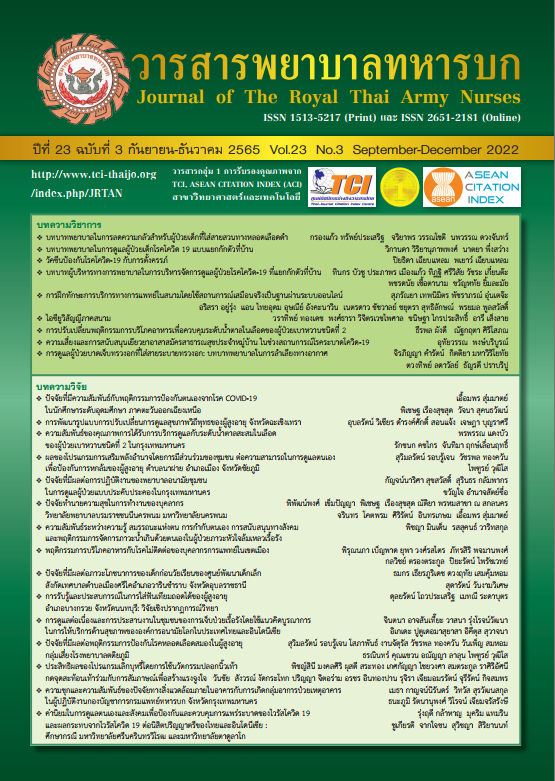The Effect of the Mental Health Promotion Program on Depression of Older Adults in the Community
Keywords:
older adults, mental health promotion, depressionAbstract
The purpose of this quasi-experimental research is to examine the effect of a mental health promotion program on the depression of older adults. The purposive sampling of the samples were equals and 60 years older, who were receiving health services at the rehabilitation center The samples were randomly assigned and match-paired according to gender for both the experimental and control group, with 30 persons in each group. The experimental group participated in the mental health promotion program for eight weeks, 60 to 90 minutes once a week. On the other hand, the control group received nursing care as usual. The research instruments were a demographic questionnaire and the Center for Epidemiologic Studies-Depression Scale (CES-D) questionnaire. The CES-D questionnaire showed a Cronbach’s alpha coefficient reliability of .87. Descriptive statistics were used to analyze the frequency, percentage, and chi-squared test. The mean score for depression for the experimental group was compared in terms of the pretest and posttest using dependent t-test. Additionally, the mean score for depression between the experimental and control group was compared using independent t-test. The results revealed that 1) after the experimental group participated in the program, the mean score for depression (M = 14.90, SD = 2.59) was significantly lower than before participating in the program (M = 20.13, SD = 3.10) (t = 17.11, p<.001); and 2) the mean difference in the mean score for depression between the pretest and posttest for the experimental group (1 = 5.23, SD = 1.67) was significantly greater than for the control group (2 = 1.86, SD = 2.14) (t = 14.28, p<.001) In conclusion, the research findings showed that the mental health promotion program effectively decreased depression among older adults.
Downloads
References
Department of Mental Health. Prevention of mental disorders: effective measures and policy options.Chiang Mai: Systematic Innovation Development Program for Mental Health Promotion. 2017. (in Thai).
Yodkul SP. Predictive Factors of Depression Among Older People with Chronic Disease in Buriram Hospital. Journal of nurses’association of Thailand, North- eastern division.2012;30;3: 50-56. (in Thai).
Thanin K. Somphon R. Darawan T. Daruneepoo K. Somchit L. Phra Sri Maha Pho Hospital and others. 2011. Clinical practice guideline for medical therapy.Mental societies of depressed patients for psychiatric nurses in tertiary care settings. Ubon Ratchathani: Phra Sri Maha Pho Hospital, Department of Mental Health, Ministry of Public Health.
Saifon. E. Roojak Doolae Khaojai PhawaSuemsao, Bangkok. 2012.(in Thai).
Soonthornchaiya Rangsiman. Reminiscence therapy: psychosocial therapy in patients. Elderly depression. Journal of Psychiatric and Mental Health Nursing, 2017;25(2), 1-11. (in Thai).
Wiramon. K. Communication with the elderly with depression. Journal of the Nursing Council, 30 (3), 5-14.Statistics of mental health patients in Thailand. 2017. (in Thai).
Luebunthawatchai O. Mental Health and Psychiatric Nursing. (4th edition). Bangkok: Chulalongkorn University Printing House. (2011). (in Thai).
Department of Mental Health. Guidelines on social and psychological care of the elderly to prevent mental health problems. Nonthaburi: Agricultural Cooperative Federation of Thailand. 2015. (in Thai).
Buddhametta M. Selected Factors Associated with Depression in Elderly People with Depression.Depression in the central region. Journal of Psychiatric and Mental Health Nursing , 2016;30 (2), 69-82. (in Thai).
Ortega, A. R., Chamorro, A., & Mar Ia Colmenero, J. E. (2013) A program of positive intervention in the elderly: memories, gratitude and forgiveness Encarnaci on Ram ırez.
NaAyudhaya S. Qigong and Depression in the Elderly, Journal of Allied Health Sciences Suan Sunandha Rajabhat Universit. 2016;1(1), 30-38 (in Thai).
Rachabut. A Study of Mental Health Promotion and Social Depression Prevention Program. and culture in the elderly. Journal of KKU Academic Affairs, .2017;20(40),115-125. (in Thai).
Ananpatiwet SD. The effectiveness of a modified positive psychology-based program on happiness and negative emotion in parents of children with autism spectrum disorder. The journal of psychiatric nursing and mental health.2017;31(3),30-44 (in Thai).
Ho, H. C. Y., Yeung, D. Y., & Kwok, S. Y. C. L. (2014). Development and evaluation of the positive psychology intervention for older adults. Journal of Positive Psychology, 9(3), 187–197.
Chaleoykitti, S. Onsri, P. Journal of The Royal Thai Army Nurses with The Way of Quality Development of Thai Journal in The Past to The Present. Journal Royal Thai Army Nurses, 2022
Seligman, M. E. P., Rashid, T., & Parks, A. C. (2006). Positive psychotherapy. American Psychologist, 61(8), 774–788.
Najeon J. Brain and Emotions: The Miracle of Connectivity. Ratchaphruek Journal, 2015; 13 (3), 9-19 (in Thai).
Chaves, C., Lopez-Gomez, I., Hervas, G., & Vazquez, C. (2017). A comparative study on the efficacy of a positive psychology intervention and a cognitive behavioral therapy for clinical depression. Cognitive Therapy and Research, 41(3), 417–433.
Watcharagup Y. and Jisuchon S. The impact of COVID-19. to the elderly. 2020
Nakhaai W. The process of participating in the prevention of COVID-19. Case study of the elderly Nong Tako Community Power. Journal of Humanities and Social Sciences, Thonburi University, 2020;14(3), 21-30. (in Thai).
Department of Mental Health. Risks and impacts on the elderly during Covid-19 2021
Downloads
Published
How to Cite
Issue
Section
License
Copyright (c) 2023 Journal of The Royal Thai Army Nurses

This work is licensed under a Creative Commons Attribution-NonCommercial-NoDerivatives 4.0 International License.
บทความหรือข้อคิดเห็นใดใดที่ปรากฏในวารสารพยาบาลทหารบกเป็นวรรณกรรมของผู้เขียน ซึ่งบรรณาธิการหรือสมาคมพยาบาลทหารบก ไม่จำเป็นต้องเห็นด้วย
บทความที่ได้รับการตีพิมพ์เป็นลิขสิทธิ์ของวารสารพยาบาลทหารบก
The ideas and opinions expressed in the Journal of The Royal Thai Army Nurses are those of the authors and not necessarily those
of the editor or Royal Thai Army Nurses Association.






